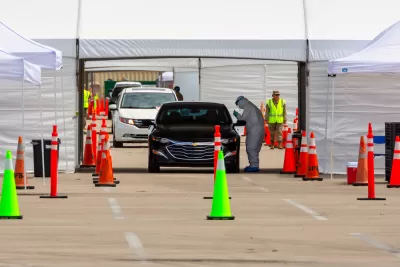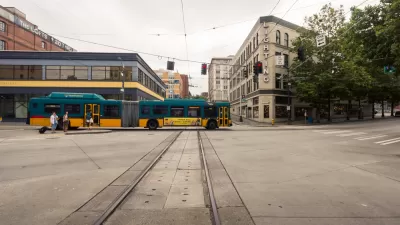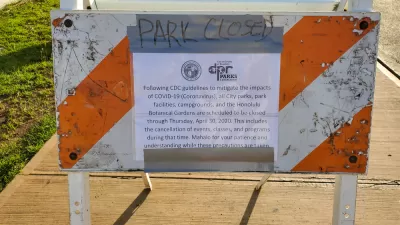Disability rights advocates and people who rely on public transit put pressure on Mayor Jenny Durkan to develop a plan for pedestrian access to coronavirus testing centers in Seattle.

Drive-through coronavirus testing is generally a safe way to limit contact between medical professionals and those who seek to be tested. The Seattle Times counts that the majority of the over two dozen Seattle area testing sites offer only a drive-through option, leading community members to question: How can people access testing without a car?
"Advocates for people who ride transit and people with disabilities asked Mayor Jenny Durkan and the Seattle City Council Wednesday to require drive-thru services, including health care and businesses like fast-food restaurants, to allow people to approach on foot or using a wheelchair," reports Heidi Groover. Mayor Durkan's office said in a statement that they would be supportive of a measure to allow pedestrian access to testing facilities and other drive-through services, but has yet to make a plan for legislation.
People without access to cars raise reasonable concerns about traveling in general due to the increased risk of exposure on public transit as well as ride-hailing services. King County officials encouraged people to avoid public transportation and announced that King County Metro is working with public health officials to develop a service to facilitate people with COVID-19 in getting to their medical appointments.
Prior to the onset of the pandemic, Portland adopted guidelines allowing for bicyclists and pedestrians to access drive-throughs when other pedestrian areas were closed. There is ongoing support in Seattle for the immediate adoption of a similar policy.
FULL STORY: How to get tested for coronavirus in Seattle if you don’t have a car

Planetizen Federal Action Tracker
A weekly monitor of how Trump’s orders and actions are impacting planners and planning in America.

San Francisco's School District Spent $105M To Build Affordable Housing for Teachers — And That's Just the Beginning
SFUSD joins a growing list of school districts using their land holdings to address housing affordability challenges faced by their own employees.

The Tiny, Adorable $7,000 Car Turning Japan Onto EVs
The single seat Mibot charges from a regular plug as quickly as an iPad, and is about half the price of an average EV.

With Protected Lanes, 460% More People Commute by Bike
For those needing more ammo, more data proving what we already knew is here.

In More Metros Than You’d Think, Suburbs are Now More Expensive Than the City
If you're moving to the burbs to save on square footage, data shows you should think again.

The States Losing Rural Delivery Rooms at an Alarming Pace
In some states, as few as 9% of rural hospitals still deliver babies. As a result, rising pre-term births, no adequate pre-term care and "harrowing" close calls are a growing reality.
Urban Design for Planners 1: Software Tools
This six-course series explores essential urban design concepts using open source software and equips planners with the tools they need to participate fully in the urban design process.
Planning for Universal Design
Learn the tools for implementing Universal Design in planning regulations.
Smith Gee Studio
City of Charlotte
City of Camden Redevelopment Agency
City of Astoria
Transportation Research & Education Center (TREC) at Portland State University
US High Speed Rail Association
City of Camden Redevelopment Agency
Municipality of Princeton (NJ)





























